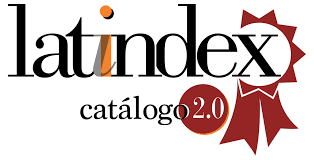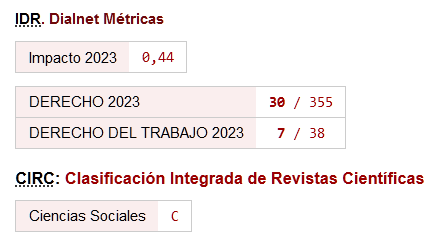About the Journal
Its mission is to highlight the findings of legal and socio-legal research conducted by national and international scholars, following standardized publication criteria, in order to contribute to and influence global discourse in these fields.
Its objective is contribute to and enrich the scientific debate on social rights and human rights, addressing our society's legal needs as it relates to them.
Its electronic format allows a wider reach of audience. The commitment is that Lex Social can, little by little, become a reference journal for jurists, the academic community and also for all those who wish to approach the debate.
The Journal, in a complementary manner, declares itself open to all disciplines. For this reason, we welcome contributions from the social sciences, humanities and, of course, from the legal sciences in their broadest dimension.
Lex Social, Journal of Social Rights is a scientific journal with a long history and international scope that aims to promote reflection and multidisciplinary research on social rights and seeks the highest international excellence.
It is a free and open access journal that publishes two issues a year.
Manuscripts can be written in Spanish, English, French or Italian. They must be the result of original research on the material scope of the journal mentioned. Comments or reflections of experts or personalities who have developed responsibilities in international organizations as well as reviews of scientific publications are also included.
Lex Social, Journal of Social Rights is a peer-reviewed academic journal published by Pablo de Olavide University, which holds legal ownership of the publication. It only has the economic support of the aforementioned entity.
Peer review process
The journal uses the "double-blind" evaluation system, so the identity of both the reviewer and the author must be unknown during the evaluation process. The manuscript will be anonymized by the Director/Editor in Chief or the Managing Editor, who will be responsible for ensuring that the identity of the evaluators and the authors of the papers cannot be revealed at any time. The evaluation process of accepted manuscripts will take a maximum period of 3 months.
After its anonymization, it will be assigned to one of the members of the Editorial Board. The latter will forward it to two members of the Review Board, subject-matter experts outside the editorial organization of the journal ("double blind" peer-review). After sending the message with the manuscript and the evaluation template, they have a period of 7 calendar days to accept or reject the evaluation. If accepted, they have a period of 30 calendar days to send a reasoned report on the scientific quality of the manuscript and their determination of whether to publish it. The external evaluations of each manuscript may adopt five types of decision:
1. Accept the text as it is.
- Accept with minor corrections: the manuscript will be published after minor improvements
- Accept with substantive corrections: the manuscript will be published after major improvements have been made.
- Reject: the manuscript requires major recommended revisions and, if made, may be subject to a new evaluation process.
- Reject: the manuscript will not be published
The evaluation report made by the reviewers will be examined by the person assigned from the Editorial Board. If there is no agreement among the evaluators, an additional evaluation by a third expert may be requested.
The reports of the external reviewers, duly anonymized, will be sent to the author by e-mail. In the case of minor corrections (decision 2), the author will have 7 calendar days to submit the study. In the case of substantive corrections (decision 3), the deadline will be 30 calendar days. If the study is rejected because it requires major revisions and a new evaluation process (decision 4), no deadline is set, since the new submission must initiate the acceptance procedure indicated above.
Open access policy
This journal provides immediate free access to its content under the principle of making research freely available to the public, which fosters a greater exchange of global knowledge.
Inmediate free access
The content of this journal will be available for free access.
Lex Social publishes twice a year: January-June and July-December. As of November 1, 2022, it incorporates a novelty in its operation. Following the trend of other national and European electronic journals, issues will be prepared as soon as articles are accepted by the Review Board.
A volume/issue called "In press" will be available on the journal's platform. This is the one that will be published as soon as the month determined for its usual volum/issue publication arrives. This will include, with final layout and DOI, the accepted studies (as long as the author agrees). The aim of this change is that the studies can be disseminated without waiting, as is usually the case, a few months. It makes the journal more dynamic, making current and relevant studies that may be of interest automatically available to readers. It also avoids that some of them, when they are published, are out of date due to normative or jurisprudential changes.
When the month of publication arrives, the issue "In Press" becomes definitive, replacing the provisional name with that of corresponding volume and issue.
It should be noted that, on occasion, monographic issues are published, as well as Congress/Conference/Seminar Proceedings.
Copyright notice
Authors who have works published in Lex Social retains copyright and grants the journal the right to publish their work, which will be simultaneously subject to the Lex Social License Creative Commons Attribution-NonCommercial-ShareAlike 4.0 International (CC BY-NC-SA 4.0).
History of the Journal
Lex Social: this social rights journal, which publishes two issues per year, was born thanks to a collaboration of native and foreign jurists, guided by Professor Manuel José Terol Becerra, Professor of Constitutional Law at the University Pablo de Olavide of Seville. Since November 1, 2014, this team has also been led by Professor Carmen Salcedo Beltrán, University Professor of the Department of Labor Law and Social Security at the University of Valencia.
Its aim is to contribute to and enrich the scientific debate on social rights and human rights, addressing our society's legal needs as it relates to them.
Its electronic format allows a wider reach of audience. The commitment is that Lex Social can, little by little, become a reference journal for jurists, the academic community and also for all those who wish to approach the debate.
The Journal, in a complementary manner, declares itself open to all disciplines. For this reason, we welcome contributions from the social sciences, humanities and, of course, from the legal sciences in their broadest dimension.
Gender Guidelines
The journal Lex Social recommends including a gender perspective in all published research, both in the research design and in the drafting of manuscripts, when relevant.
Authors are encouraged to use inclusive and non-sexist language in the writing of any contribution to the journal. In the event that there are differences in the source data in terms of sex, this fact should be mentioned in the article.
To facilitate this task, a compilation of Guides from the Ministry of Equality is available, which compiles a non-exhaustive list of up to 120 examples with guidelines to follow.


 @Lex Social
@Lex Social Linkedin
Linkedin @lexrevista.bsky.social
@lexrevista.bsky.social



